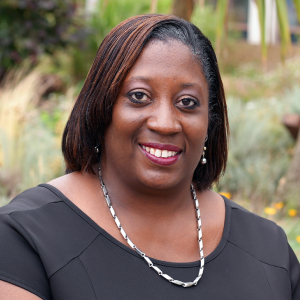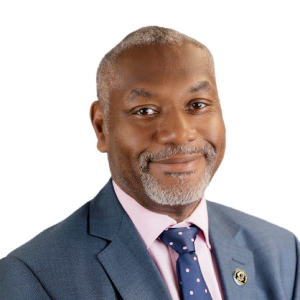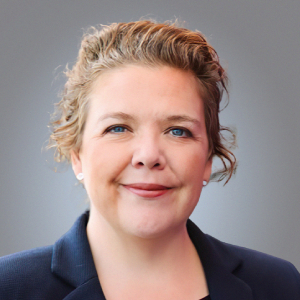While panel members spoke candidly about retention challenges in the NHS, they also highlighted opportunities to innovate and improve the workforce system.
For Martin Griffiths, the sense of unhappiness and ‘existential threat’ felt by many in the healthcare workforce at this time presented ‘a real opportunity to disrupt the traditional narratives around what employment and experience look and feel like, and to change the system for the better’.
Clinical apprenticeships and a fresh look at medical training were two constructive ways to achieve this, he argued.
“What's the problem of apprenticeships? Why are we so scared of them? What's wrong with allowing individuals to enter into a career in clinical work from where they are now? Why do we have to be hot-housed into GCSEs and A-Levels, and pick that tiny proportion of people who meet that target, and then hot-house them into a career and say you have to do this for the rest of your life? What's wrong with starting older, or starting in a different space? What's wrong with getting paid to learn?
“Apprenticeships are the key to attracting and developing a workforce who want to do the work and who have been barriered by the way we select our staff. I think the only way we're going to encourage people who want to have autonomy and choice in their clinical career is to allow them to enter it in a way that's much more equitable. I understand the scare stories about not having appropriate skills. But to me, I'm an apprentice myself. For me, working and learning on the job with experienced people, acquiring institutional knowledge, acquiring the culture and behaviours, being treated as equal as you learn, getting paid and being good on day one - it's an ideal solution, is it not?”
Cheryl Samuels agreed and said apprenticeships were an opportunity to expand the medical workforce so it is more inclusive and better for patients.
She said: “If you want to go to medical school, you've got to have the support, the backing and the finances. There are lots of things you need to have in place to go and do that, as opposed to, for example, choosing to be a bus driver. There is something about how we disrupt the patterns of inequality, and embrace the opportunity to get people in from various parts of society who, once they are in that workforce, will mean that we get greater representation, we get people who our patients will be able to relate to and who will equally be able to relate to their patients.
“There's a real opportunity for us to close the gap around how we communicate with our patients, how we train our staff, and recruit from backgrounds that are representative of the communities in which they serve. I don't think we've cracked that at all levels across all the professions.”
Cheryl continued by saying there should be a stronger emphasis on values and behaviours in recruitment, adding:
“We haven't got all our leaders and recruiters used to really looking for the values that people espouse and recruiting for that. I've sat on many disciplinary panels and appeals in my time and when you look at the sort of conduct issues involved, they could have been resolved had people just had a different attitude, different behaviour, different communication style and a different way of handling conflict.
“If we were tested for some of these things, it would mean we were recruiting values-driven people, we would have the compassion in our organisations, we would have people who are caring, respectful and thoughtful. Instead, sometimes we are testing for technical skills, which are not really needed for some roles at a senior level.”
Martin Griffiths, who works closely with medical undergraduate programmes, said: “Nobody cares what I look like at 3am if I’m competent, do they? We need to work around competence rather than qualifications.
“Competence-based practice is important; how you get to that line isn't really important. I don't think we can all come from the same lineage and say that's right. It doesn't make any sense. Our patients aren't that way, our staff aren’t that way. We need to get the benefit from having a diverse workforce, not just in demographics, but in experience and journeys [into medicine], because that gives us a much more powerful ability to support our communities, patients and organisations.
Responding to panel chair Anne-Marie Archard’s question ‘Where is the hope?’, Helen Ives highlighted positive examples of working differently to solve recruitment challenges at scale.
Helen said: “When we've put things in place with our partner Trusts, such as net-new programmes for healthcare support worker development, we've found that we do that at scale really well in the NHS. I was privileged recently to judge the Nursing Times Workforce Awards, and I heard real bright spots of working differently at scale and bringing new people into organisations from new demographics. The spirit of that was also captured in the Long Term Workforce Plan.
“Having said that, we've got to break some stuff down. As the largest employer in the UK, we need to have a strong voice about how apprenticeships run, what flexibility they have and how we can access the Apprenticeship Levy, for example. If you're a Bank worker and not an employee, you can't access the levy, which is a real own goal because we have so many people working on the Bank who are exploring possible career options in the future, or maybe working at a particular practice level and who are really keen to top up.
“We need to explore innovations like flexi-job apprenticeships, where we can think differently about how we deploy healthcare staff and how we use that 20% off-the-job time – perhaps working flexibly in another team, for example.”
Cheryl Samuels said it was important for training programmes to ‘positively disrupt people’s thought patterns’.
She said: “It’s about starting with self, and starting to challenge your own perceptions, beliefs and biases, whether they are about flexible working, understanding how teams work, or inclusion and belonging. It means having trainers who are giving you perspectives and thoughts around things that ordinarily you might not have been exposed to, depending on your background.”
For Martin Griffiths, supportive coaching was ‘integral’ to the development of effective clinical skills and practice. ‘Professionalising’ this support, so it was a core part of clinical practice and there for everybody at all points in their careers – especially new starters and those from different backgrounds – was another important opportunity to be more inclusive and improve NHS care.
He said: “We shouldn't just coach people ad hoc or because we like them; we should do it as part of our practice to make sure everybody in the system has somebody to support them. It's very hard being the first one in a space, or the odd person out. We attract people from diverse backgrounds, but they're not supported and you have to have somebody to help you navigate the system. I think when we do that bit right, we will see our service flourish.”



